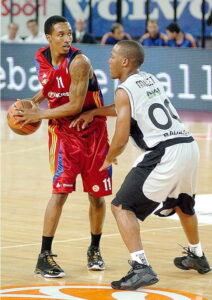by The Cowl Editor on September 12, 2019
Sports
By Thomas Zinzarella ’21
Sports Staff

Top high school basketball players are caught in limbo in the fall and winter months of the year as they decide where they want to spend their college career and play basketball. But athletes looking to be paid for playing have another option—playing overseas.
For years, players could choose to come out of high school and go straight into the NBA or spend four years in college and play basketball. This changed in the 2005 NBA Collective Bargaining Agreement after a group of players from 1995-2005 headed straight from walking around their high school to making millions in the NBA Draft. The likes of Kevin Garnett, Lebron James, Kobe Bryant, and others all followed this route.
In 2005, the one-and-done rule was created in which players only had to play one year in college before entering the draft. The rule was created to deter players from going straight to the NBA after high school. The minimum age to enter the NBA was also increased to 20 years old.
Playing overseas is far better than playing in the NCAA for many reasons. Players want to be compensated for their efforts rather than feel cheated from the system that is the NCAA.
Many college basketball players come from poor urban areas and want to make money playing professional basketball. For many players, the biggest problem is that the NCAA makes an estimated $700 million every time March Madness rolls around. Forty percent of these profits are kept by the NCAA and the rest is given to the schools who participated. Just for making the NCAA tournament, a school receives a check of $1.67 million. A Sweet 16 run gives a school a $5 million dollar bonus. A Final Four run yields the most: $8.3 million.
After all the celebration is done, a handful of players come away with a championship and some memories made (along) the way, but their wallets are still empty, while their school profits on their talents.
According to the NCAA’s website, an athlete is not eligible to participate in a sport if they have “taken pay, or the promise of pay, for competing in that sport. [Bylaw 12.1.2] or agreed (orally or in writing) to compete in professional athletics in that sport.”
Rules such as these have prevented many athletes from playing. Some players have taken matter into their own hands and gone into professional leagues in hopes of jumping to the NBA.
Mitchell Robinson, a McDonald’s All-American in high school, played a few months with Western Kentucky University before dropping out and preparing for the NBA Draft. Robinson averaged 7.3 points per game and 6.4 rebounds per game this year for the New York Knicks in his rookie campaign.
Anfernee Simons chose to play five years in high school and was drafted in first round by Portland Trail Blazers. There have been a number of stories in the last four to five years of players skipping college in favor of going professional right away in other countries.